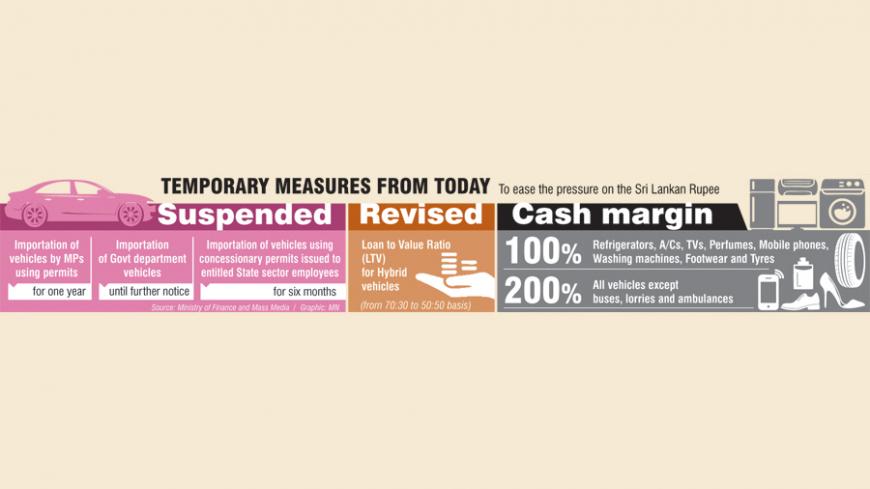
The Ministry of Finance yesterday pulled the brakes on non-essential on imports to ease pressure on the falling rupee, but in an unprecedented move, announced that the host of temporary spending cuts would directly impact lawmakers as well as state sector employees and the public.
From today, September 30, the importation of vehicles through permits issued to MPs has been suspended for a period of one year, while import of vehicles for State Ministries, Departments, Statutory Boards and State-owned enterprises have also been postponed until further notice.
The import of vehicles using the concessionary permits issued to entitled-State sector employees has been put off by six months.
“The government showing the way by example is important. We have a situation that requires curtailing new imports of non-essential and luxury imports and therefore, we have made these applicable to politicians as well. We are also requesting others to postpone consumption,” State Minister of Finance, Eran Wickramaratne told the Sunday Observer yesterday.
With a view to apply brakes on the import of hybrid motor vehicles, the Finance Ministry has also announced revisions to the Loan to Value Ratio (LTV) for hybrid vehicles from the present 70:30 to 50:50 basis. On the other hand, importers of all vehicles (except buses, lorries and ambulances) have been mandated to maintain a 200% cash margin at the time of opening Letters of Credit.
Further, a requirement of 100% cash margin has been imposed for the import of consumer goods such as refrigerators, air conditioners, televisions, perfumes, telephones including mobile phones, washing machines, footwear and tyres.
“However, though these measures will be effective temporarily from Saturday 29, 2018. the government will continuously monitor exchange rate fluctuations and will take appropriate action accordingly,” the Ministry said in a statement.Sri Lanka’s widening trade deficit, amidst rising oil prices and slow capital inflows, is viewed as a key vulnerability for the economy and one of the main reasons the Rupee has been hit amid an emerging-market rout this year.
It is learnt that the fiscal tool announced by the authorities yesterday with a view to bring back exchange rate stability by making imports expensive, follows similar steps taken by neighbouring India and Indonesia recently.
However, according to State Minister, Wickremeratne the recent Rupee depreciation is not a cause for panic as it is not an internal issue but a relative issue that is affecting the rest of the world. The Minister said he is optimistic that the situation would automatically stabilise if people could use ‘self-discipline’ on imports. “We are trying to make behavioural changes to get people to postpone the consumption of non essentials and luxuries that are imported. But that need not be a big amount and even a fraction of what we are doing now would help,” Wickremeratne pointed out.According to recent statistics, while Sri Lanka’s cumulative exports during the first half of this year (January 2018 to June 2018) grew by a mere 6.2% to US$ 5.7 billion year-on-year, the pace of growth in imports has, however, doubled registering a growth of 12.7% to US$ 11.4 billion. Consequently, the island’s trade deficit had expanded by a sharp 20% to US$ 5.7 billion in the first half of this year, Central Bank statistics showed.
On the other hand, Sri Lanka’s imports of consumer goods during the first six months of this year rose by a sharp 18% to US$ 2.62 billion driven primarily by imports of personal vehicles which skyrocketed by 120% to US$ 813 million. Consequently, the Central Bank had introduced a 100% cash margin on Letters of Credit to slow down the pace of vehicle imports. During the year up to 28 September 2018, the Sri Lanka rupee has depreciated by 9.7% against the US dollar, recent officials statistics showed.
Last week, State Minister of National Policies and Economic Affairs Dr. Harsha de Silva had opined that Sri Lankans should accept austerity and postpone their consumption of items which cause a drain on foreign currency like luxury automobile purchases or lavish foreign travel. “Social consciousness of our high income people is also important now; perhaps postpone by just a couple of months that new luxury car or that trip to Alaska. These will all help to cut the demand at the margin,” the Minister said.On Monday (24), Prime Minister Ranil Wickremesinghe indicated that the government may have to curtail imports by atleast US $500 million to US $1 billion because of the current economic circumstances. In terms of foreign exchange inflows, although Sri Lanka’s earnings from tourism in the first half of this year had improved by a sharp 15.3% to US$ 2.1 billion YoY, worker remittances has however registered only a marginal growth of 0.9% US$ 3.6 billion.
Last week, Sri Lanka’s largest trading partner, India raised tariffs on customs duties on products ranging from aviation fuel to footwear in an effort to bolster its weak rupee and tackle its widening current-account deficit. The taxes on 19 items, imports of which were valued at US$ 12 billion was made effective from Thursday (27).
The Indian finance ministry said tax rates have been raised by as much as 10% on 19 categories of imports which the government considers nonessential, such as air-conditioners, refrigerators, washing machines and jewelry.
The Indian currency has been among the hardest hit as most emerging market currencies fell plunging by around 14% this year.
